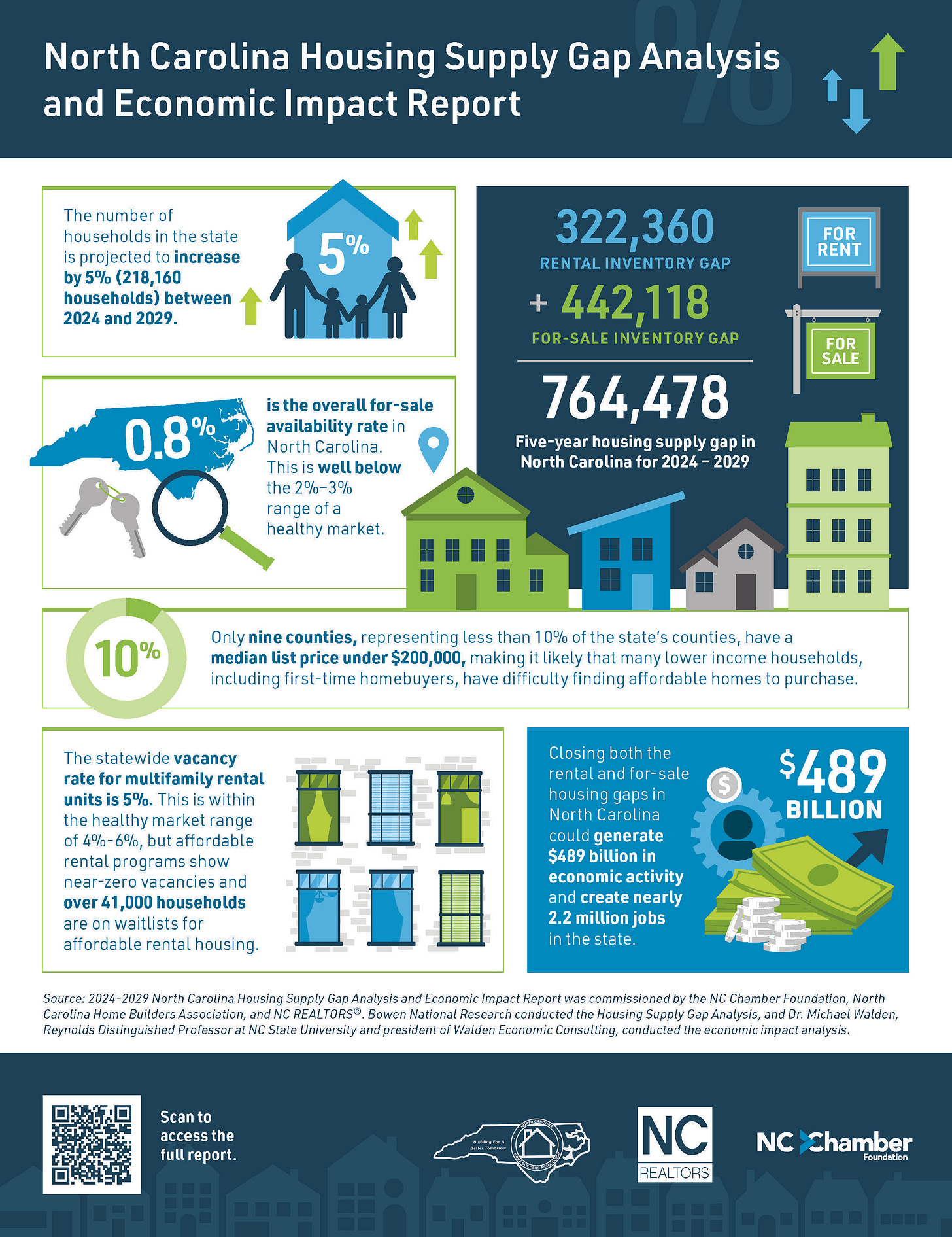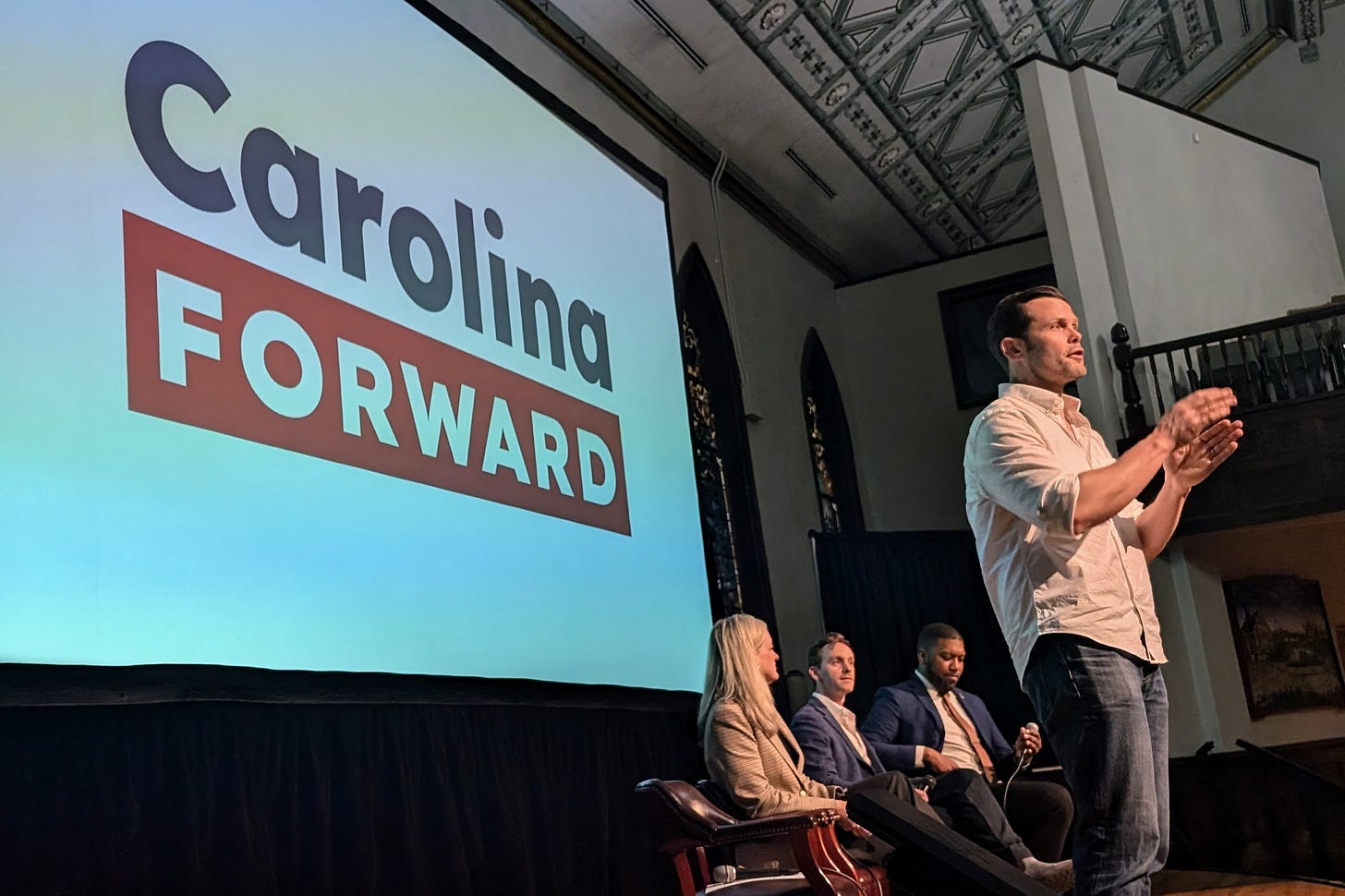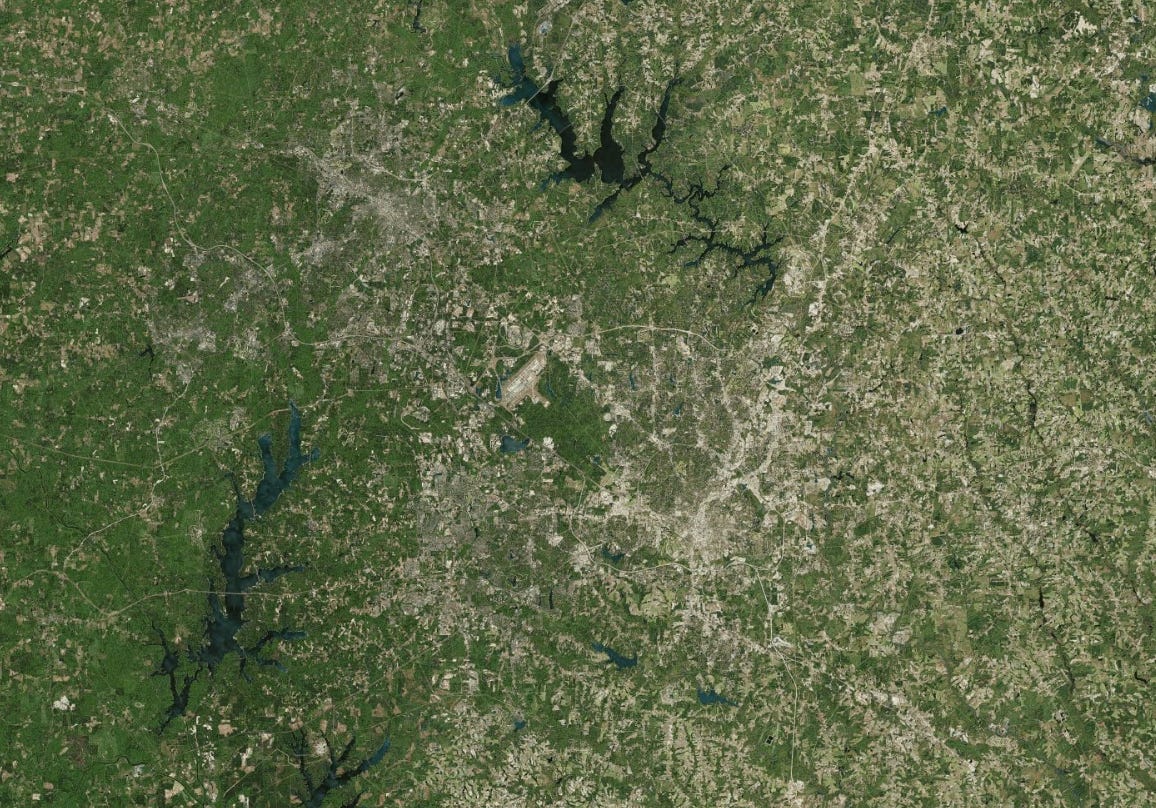The Status Quo We Inherited
How Raleigh and Durham are undoing a legacy of exclusion by embracing housing and urban growth
For decades, the Triangle’s status quo was built on exclusion.
Over the past half-century, the region has experienced steady but unequal growth. The very shape of the Triangle reflects it: our dispersed, multi-centric city fabric is the result of policies that have selectively left communities behind.
It began with racial zoning. Then came racial covenants and the spread of single family zoning, reinforced by redlining insurance maps. Later, urban renewal purposefully targeted and destroyed denser multi-family mixed-use parts of both Raleigh and Durham. The preservation movement that formed in reaction to urban renewal, often led by well-meaning white progressives who became the first wave of gentrifiers, ended up adding more layers of restriction. Over time, these policies and overlays have accumulated and combined to lock in a single-family legacy under the banners of preservation and small town values.
Author Jerusalem Demsas has written about similar effects across the country for years. She now writes at The Argument right here on Substack. Demsas tells the stories of how these layers of rules and veto points have given a small, unrepresentative group of people the ability to stop housing in our communities. Scarcity is not natural or inevitable. Housing scarcity was created by policy choices.
Until recently, city officials and neighborhood organizations had the same priorities: freeze neighborhoods in place through restrictive zoning, protect property values above all else, and push growth outward to the suburban fringe.
The results were predictable. Families have been steadily priced out of Durham and Raleigh. As desire to live here has drawn people from across North Carolina, the nation, and the globe, population growth has spilled beyond the Triangle’s core cities into rural counties and small towns. Suburban sprawl has become exurban sprawl that continues to pave over farmland and forests.
Sprawl has meant fewer walkable neighborhoods and weaker city corridors. Instead of allowing more homes along transit routes and inside existing communities, policy pushed growth outward. That made it harder to connect daily life without a car and left many families farther from jobs, schools, and services. The alternative to sprawl is infill and corridor growth. By adding housing where people already live and work, this approach strengthens city life, supports small businesses, and creates neighborhoods that last.
Infill and corridor growth are not just about walkability and sustainability. These are essential tools to address our housing shortage at the scale it demands — inside our cities, not at their fringes. Over decades, the Triangle has fallen further behind on housing production. As a result, rents and home prices rose faster than wages, adding unaffordability to the list of regional woes.
Research by the NC Chamber of Commerce projects that North Carolina will be short 764,478 housing units over the next five years. This six-figure housing shortage is the direct legacy of exclusionary zoning and the single-family status quo. Continuing that legacy would mean a Triangle that costs even more, consumes what little natural environment remains, and welcomes fewer people.

The Triangle Turns Toward Reform
Despite the massive scale of our housing shortage, there is good news.
Over the past few years, strong leadership in Raleigh and Durham have created an alternative to the single-family status quo. Recent policy changes, zoning reforms, and affordable housing bonds in both Raleigh and Durham are changing the story:
Durham passed Expanding Housing Choices in 2019, and opened the door to duplexes and accessory dwelling units (ADUs) across the city.
Raleigh legalized ADUs and passed Missing Middle reforms, legalizing gentle density citywide.
Raleigh then refined their Missing Middle policies and created a Transit Overlay District, which upzones key transit-rich areas and grants density bonuses for projects that supply affordable housing.
Durham voters passed a $95 million affordable housing bond in 2019.
Raleigh voters passed a $80 million affordable housing bond in 2020.
Durham passed Simplifying Codes for Affordable Development (aka SCAD) in 2023, removing barriers for small infill projects.
These reforms and bonds have been crucial to undoing the problems caused by the exclusionary status quo. City leaders have sent the message that growth belongs inside city limits, not only at the edges. Collectively, we’ve declared that we will make room for more people — young people born here and people who immigrate here — instead of just preserving neighborhoods for those already here.
And these changes place the Triangle inside a much larger national conversation. As housing shortages have spread eastward, more and more communities are joining the fight through organizations like YIMBY Action or Strong Towns, and now through burgeoning ideologies like Abundance. These movements sometimes disagree, but that’s okay; solving the housing crisis is complicated work.
Let's not forget that Derek Thompson was writing Abundance while living in Chapel Hill, at the same time that the college town elected its first-ever pro-housing majority. Earlier this year, the mayors of Raleigh and Durham shared a stage with Thompson to talk housing reform. The event was hosted by Carolina Forward, captured for Reels by Hometown Holler, and even covered by the INDY.

The torchbearers of this national movement hail from many philosophies, united by a common goal. Recent articles by thought leaders Seth Zeren and Jeremy Levine help frame why building more housing is the common thread.
Zeren argues that Strong Towns’ warnings about the fiscal insolvency of sprawl and Abundance’s push to clear away barriers to building both emphasize the need for steady, incremental housing growth.
Levine emphasizes that a resilient movement needs many voices and distributed leadership, highlighting what each organization in the pro-housing camp does well, and acknowledging the foundation laid by the Congress for New Urbanism.
Together, their arguments mirror what we’re living here in the Triangle.
At CITYBUILDER, we believe cities are built by their citizens. We’ve seen firsthand that strengthening communities takes both bottom-up and top-down solutions, which means getting advocates, builders, residents, and courageous leaders to work side by side.
The Triangle is not simply following this national debate. We are leading it, showing the country what complex, pragmatic answers to the housing crisis look like.
We Are Fighting to Undo the Status Quo
Bringing the national conversation home means being clear about fighting the status quo. There are those here that point fingers at new projects or new neighbors as the problem. But the truth is that our crisis was not created by the new apartments or townhomes that fill vacant lots in our neighborhoods. The housing crisis was created by decades of exclusionary policy and the politics that protected it. That is where the blame belongs.
Reforms that allow more housing and new apartment production are not the problem. They are the solution. Raleigh and Durham rents have declined significantly over the past two years, and now growth is nearly flat. The region is a national front runner in rent reductions precisely because of these choices. The courage of local leaders to change the rules is working.
That's why CITYBUILDER is part of a rising chorus calling for more housing. We're connecting local victories to the national momentum. We are part of a progressive, growing national movement that is setting the record straight. We understand how we got here, we know who the real preservers of the status quo are, and we are making the case that more housing is the path forward.
We are citizens building cities, supporting bottom-up and top-down solutions, and showing what is possible when communities demand better.
The fight to protect the old status quo will not stop.
But neither will our fight to undo it.
Jenn Truman is a designer with experience in architecture, civil engineering, and interior design. She has worked in the Triangle for small, local architecture and civil engineering firms for over a decade, bringing to life some of Raleigh and Durham’s favorite retail and restaurant projects.
Jenn has a passion for designing experiences and places and believes in building things together. As a young designer, leader, and advocate based in Raleigh, she is embedded in the local community through her professional and volunteer work. Jenn is the Founder of CITYBUILDER.



